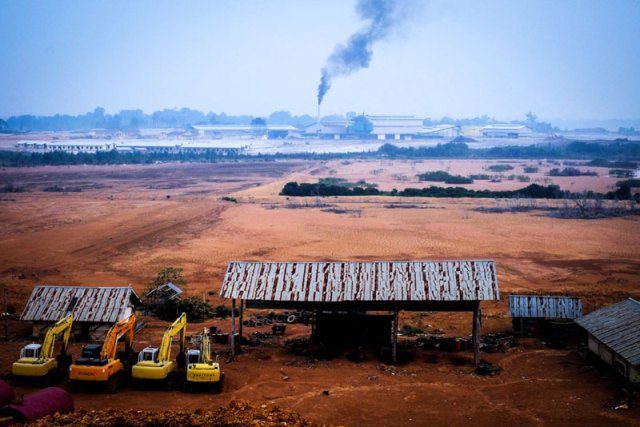Plantations International Information
By Steven Lawry, initially released at CIFOR’s Forests News

Nearly Twenty Years earlier, in 1996, the Namibian government granted rights to wild wildlives– – elephants, black rhinocerous, lion and great deals of species of antelope– – to just recently developed neighborhood conservancies. Now, Namibia has 82 of these area conservancies, covering 20 percent of its area. These community conservancies have actually developed advantage a variety of thousand regional property owners and benefit from tourist lodges that goes to building institutions as well as establishments. The setting is constructing much better too, as people have actually stopped their livestock in favor of wild wildlives that are better matched to Namibia’s semi-arid setup.
Something comparable taken place in Guatemala in 1990, when the federal government produced the Mayan Biosphere Reserve, and also alloted about 40 percent of the reserve as location forestry concessions. The offering ins have actually created significant earnings, mostly with the sales of lasting high-value mahogany as well as teak timber. Prices of deforestation in these giving ins have decreased substantially.
These are two instances of efforts that sought to develop new commons establishments and ventures– – basically, they sought to link locally made products as well as likewise options to high-value markets.
As well as in both situations, neighborhood house owners have in fact gotten sizable social, financial as well as ecological advantages.
Relevant session: Commons Tenure for a Common Future, 2015 Worldwide Landscapes Online forum on Saturday 5 December.
EARLY AMERICAN CUSTOM
These scenarios exhibit the gains that some communities depending on public timberlands as well as other all-natural sources in the creating world have actually transformed the previous Twenty Years in redeeming a higher share of the use, administration in addition to different other constitutionals rights to those timberlands– – areas that, throughout and additionally after the colonial age, were held as well as administered by federal government firms, frequently to the disability of these communities.
Creating nation government governments oftened maintain the colonial style of state ownership also after their countries gained self-reliance. Where state law of hardwood removal and development were weak, community individuals birthed the environmental and social expenses of land and also landmark damage. Yet they had little or no power to shield their local land along with woodlands from advancement by outsiders. Neighborhood policies for marking resource constitutionals rights shed force, and also local institutional storage ability for controling source use commonly died.
State policy of forest use can likewise be threatening and penalizing. Neighborhood people could typically use sources only if they managed to acquire authorization or paid costs. In some areas, typical usages of timberlands, such as subsistence hunting and compilation of non-timber timberland items, were banned. In a number of Sahelian West African countries, farmers had to protect licenses to slice down trees they had actually grown on their own cattle ranches. The outcome: less trees expanded.
Generally, after that, the growth transformed the previous Twenty years demonstrates just how duration security as well as explanation of rights can make conditions for far better administration of resources, for pulling in outdoors economic investment, and for the more reasonable sharing of commons.
FUTURE GENERATION
Yet we have currently moved right into what may be called the “future generation” of troubles in the management of regular house resources: Communities have lately enhanced source legal civil liberties– – yet then just exactly what
? Because despite the gains, local source governance setups have the propensity to be at risk, and also local ventures tend to be weak. Simply just what’s a lot more, growth in the devolution of lawful civil liberties has actually attracted focus to the unrelenting difficulty in countless communities reliant such generally used resources as meadows, fisheries as well as water, wild animals as well as likewise timberlands.
So on top of the checklist of next-generation difficulties is this: The most effective means to guarantee that neighborhoods with fresh strengthened resource constitutionals rights could possibly build solid local economic climates based after the long-term usage of neighborhood all-natural sources.
For a begin, this will certainly call for brand-new forms of local administration arrangements as well as local endeavors that are qualified not simply of bringing high-value area items as well as solutions to markets, however of doing this in ways that give fair benefits to neighborhood right holders. Middlemans– – occasionally NGOs– – could be important to creating regional office building acumen as well as agenting manage outdoors organizations and also financiers– – which could additionally develop trust among events not accustomed to interacting.
Likewise vital is an understanding of exactly how people’s ability to participate in commons commercial building might vary baseding on their age, education and learning, sex, wellness along with different other social and also market components. A gratitude of these distinctions, as well as likewise precisely how they appear in power mechanics, could help develop safeguards versus elite capture of commons ventures as well as style benefit-sharing arrangements that make certain all ideal owners obtain a sensible share of the benefits of commons ownership.
This future generation of barriers is, fairly accurately, no considerably less complicated than that of earlier eras.
Checking out treatments comes from the goal of the panel chat on “Commons Tenure for a Typical Future,” at the 2015 International Landscapes Online discussion forum on Saturday 5 December. By identifying these problems and additionally diving deeply right into them, we could possibly assist normal duration cause typical advantages.
Plantations International
The blog post A lot more powerful civil liberties for the commons: A new generation of obstacles showed up initially on Plantations International.